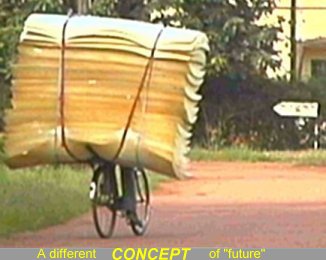 Control
questions:
Control
questions: Bert hamminga Questions about The Western versus the African Time Concept version date 000309
 Control
questions:
Control
questions:
1. Western time is linear, cardinal, and mechanical.
Explain these terms (your explanation should,of course, be perfectly clear to
yourself!)
2. Westerners say one full turn of the earth around its own axis lasts around 24 * 60 * 60
* 9,192,631,770 wave cycles of cesium. Why do Westerners not say that the wave
cycle of cesium is around 1/ (24 * 60 * 60 * 9,192,631,770 ) full turns of the earth?
3. Classical traditional African time is not linear. What does that mean? If not
linear, what is it?
4. Classical traditional African time is not cardinal. What does that mean? If
not cardinal, what is it?
5. Classical traditional African time is not mechanical. What does that mean? If not
mechanical,what is it?
6. European cultural superstition is that time runs regularly, and the future points in
time come near in the same regular speed as past points in time withdraw. Africans think
differently. How? Why?
7. Explain Mbiti's abstract concept of Zamani. How does it differ from Western past?
8. Explain Mbiti's abstract concept of Sasa. How does it differ from Western future?
9. Explain the difference of waiting, in "dead time" and waiting in "living
time". Find examples of your own for each of the four cases.
10. Explain the difference of hurrying, in "dead time" and hurrying in
"living time". Find examples of your own for each of the two cases.
11. The Westerner's interpretation of what Africans often have done when they are
"late" (from a Western point of view) is the the African has inserted time. Why
is this an improvement of understanding? Why is this still not good enough?
12. What are the big differences between a Western business agreement and a traditional
African agreement between parties? How is can this difference be explained from different
concepts of time?
13. What four categories of powers blend in the "now" force of some event that
you tried to realize? What is the order of strength?
Open question:
1. Western economic models usually a variable "t" denoting time. What is the scale on which this time is asumed to be measured? What are the conditions for these models to be applicable to countries with African culture? Which of these conditions could possible be met approximately? Which not?
Exercize:
Think of a question not posed thusfar that can clearly be answered by someone who
carefully read this web page.